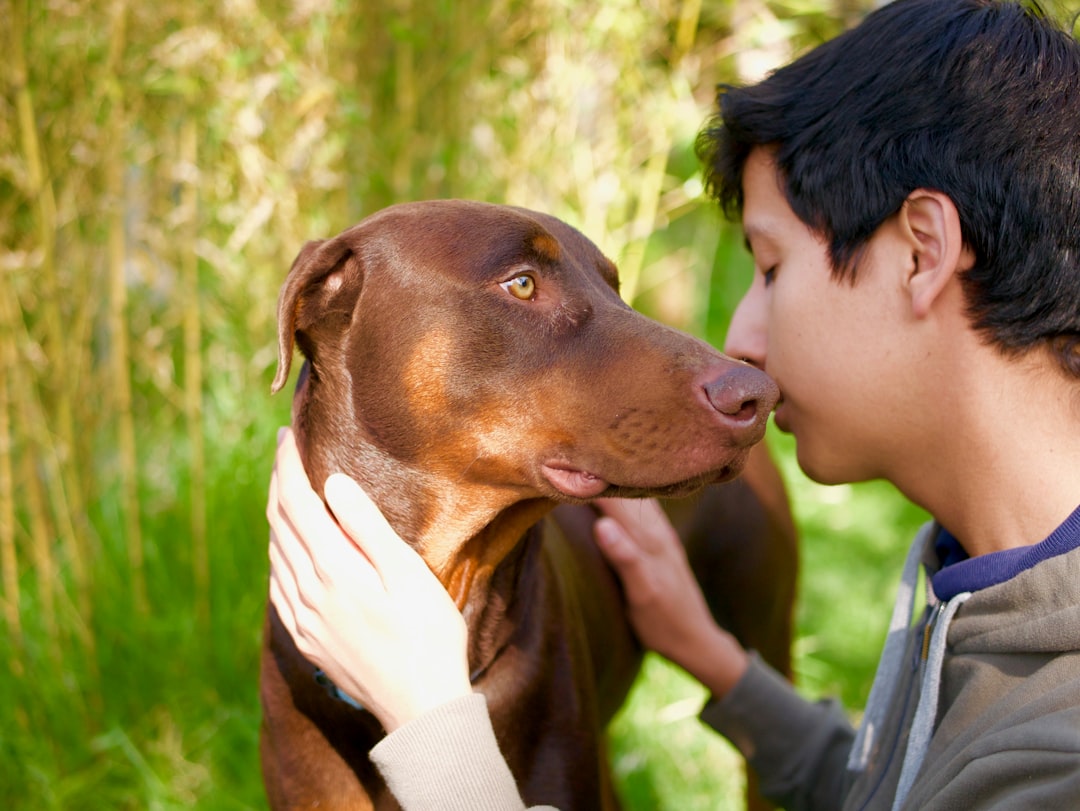The Versatile Doberman: From Service Dogs to Search and Rescue
An overview of the versatile working roles and applications of Doberman Pinschers, including their roles as service dogs, therapy dogs, and in law enforcement, as well as their excellence in obedience training and search and rescue operations.
Overview of Doberman Pinschers
Doberman Pinschers have a rich historical background, initially bred for protection and companionship by Karl Friedrich Louis Dobermann in the 19th century. To fulfill his need for a loyal and protective companion during his rounds as a tax collector, Dobermann selectively crossed several dog breeds, including the Rottweiler, German Pinscher, Weimaraner, and Greyhound, to create the breed we know today. The result was a medium to large-sized dog with a sleek and elegant appearance, standing between 24 to 28 inches at the shoulder and weighing between 60 to 100 pounds. Their powerful and wedge-shaped head, short, smooth, and dense coat, along with their unwavering loyalty, intelligence, alertness, and affectionate nature, have made them indispensable in various working roles, showcasing their versatility and adaptability.
In addition to their historical background and physical traits, Doberman Pinschers have been utilized in various working roles, including as guard dogs, law enforcement partners, therapy dogs, competitive dog sports participants, and search and rescue heroes. Their exceptional intelligence, loyalty, and protective nature have made them well-suited for these roles, and their adaptability allows them to excel in diverse environments and tasks. For example, Doberman Pinschers have been known to participate in obedience training, agility, tracking, and search and rescue operations, highlighting their versatility and capability in different working environments [1, 2]. Their historical significance and modern-day applications demonstrate the enduring relevance and importance of Doberman Pinschers as working dogs.
Versatile Working Roles of Doberman Pinschers
Doberman Pinschers are highly sought after for their versatility in working roles, excelling in various fields due to their exceptional intelligence, loyalty, and protective nature [1, 2]. As service dogs, Dobermans demonstrate their keen intelligence, easily trainable nature, and unwavering loyalty, making them suitable for tasks such as medical alerts, mobility assistance, and social signal (SSIG) roles. For example, a Doberman Pinscher can be trained to recognize the onset of a seizure in an individual and provide necessary support, showcasing their invaluable contribution as service dogs.
In therapy dog roles, Dobermans exhibit a calm and gentle demeanor, coupled with their high level of intelligence, making them ideal for providing emotional support and comfort to individuals in need. Their ability to form strong, empathetic connections with people in various environments underscores their suitability for therapy work. For instance, a Doberman Pinscher can visit hospitals and nursing homes, offering companionship and relief to patients, thus illustrating their exceptional aptitude as therapy dogs.
Furthermore, in law enforcement and search and rescue operations, Doberman Pinschers demonstrate their remarkable skills in obedience training, agility, and tracking. Their keen sense of smell and unwavering determination enable them to locate missing persons or detect illicit substances, contributing significantly to law enforcement agencies and search and rescue teams. For instance, a Doberman can be trained to track scents over long distances and effectively assist in locating individuals in emergency situations, highlighting their crucial role in law enforcement and search and rescue operations.
Doberman Pinschers as Service Dogs
Doberman Pinschers are highly suitable as service dogs due to their intelligence, trainability, and loyalty. Their versatility and adaptability allow them to excel in various service roles, making them an excellent choice for tasks such as guiding the blind, alerting to medical conditions, and providing assistance to individuals with autism.
For example, a well-trained Doberman Pinscher can be trained to detect changes in blood sugar levels for individuals with diabetes, providing them with early warnings of potential health complications. Additionally, their strength and agility enable them to assist individuals with mobility challenges, supporting them in their daily activities and enhancing their independence.
Effective training and early socialization are crucial for their successful performance as service dogs, ensuring they can fulfill their designated roles effectively. By exposing Doberman Pinschers to various environments, people, and experiences from a young age, they can develop the confidence and social skills necessary to navigate diverse settings while remaining focused on their tasks as service animals. This early socialization lays the foundation for their ability to remain calm and attentive in public spaces, contributing to their effectiveness in providing essential support to their handlers.
Training and Socialization
When it comes to Doberman Pinschers, early socialization and consistent, positive training are crucial components for their successful integration into various working roles. For example, exposing them to different environments, people, and animals from a young age helps them develop into well-rounded and adaptable companions. This socialization plays a key role in shaping their behavior and temperament, making them better suited for roles such as service dogs, therapy dogs, and law enforcement partners.
Furthermore, addressing the breed’s need for mental and physical stimulation is imperative. For instance, engaging Doberman Pinschers in activities that challenge their intelligence and physical capabilities, such as obedience training, agility, and tracking exercises, not only keeps them mentally sharp but also helps prevent boredom and potential behavioral issues. Providing them with sufficient exercise and mental stimulation not only contributes to their overall well-being but also ensures that they remain focused and responsive in their respective working roles. By understanding and fulfilling their socialization and training needs, Doberman Pinschers can truly excel in the roles they are assigned, showcasing their intelligence, loyalty, and versatility as working dogs.
Health Considerations
In addition to the common health concerns mentioned, it’s important to note that Doberman Pinschers are also susceptible to hypothyroidism and cancer, which are conditions that can significantly impact their quality of life if not properly managed. Hypothyroidism, in particular, can lead to symptoms such as weight gain, lethargy, and skin issues, highlighting the need for vigilant monitoring and appropriate medical intervention. Furthermore, while cancer can affect any breed, Doberman Pinschers have been found to be more predisposed to certain types of cancer, making early detection and treatment crucial for their well-being.
One example that underscores the significance of regular health check-ups is the potential early detection of dilated cardiomyopathy, a condition that affects the heart muscle and can lead to heart failure. By routinely monitoring the cardiovascular health of Doberman Pinschers, veterinarians can implement preventative measures and treatment strategies to mitigate the progression of this condition and improve the dog’s overall cardiac function and quality of life. This proactive approach to healthcare aligns with the breed’s loyalty and dedication to their owners, as responsible pet owners play a pivotal role in safeguarding the health and longevity of their Doberman companions.
It’s clear that while Doberman Pinschers are renowned for their physical prowess and resilience, their susceptibility to certain health issues necessitates a proactive and attentive approach to their medical care. By staying informed about the breed’s specific health concerns and partnering closely with veterinarians, owners can ensure that their Dobermans lead healthy and fulfilling lives, contributing to the breed’s legacy as versatile and dependable working dogs.
Modern Applications and Future Prospects
Doberman Pinschers have continued to prove their versatility and adaptability in modern working environments. For example, they have excelled in agility and obedience competitions, showcasing their athleticism, intelligence, and eagerness to please. Many owners have found success in training their Dobermans to compete in these competitive events, where the breed’s natural athleticism and keen intelligence are on full display.
Furthermore, the breed’s potential in evolving roles is evident in their continued involvement in search and rescue operations. Doberman Pinschers have been instrumental in locating missing persons and providing crucial support in disaster-stricken areas. Their acute sense of smell, agility, and trainability have made them valuable assets in these high-stakes situations, demonstrating their ongoing relevance and importance in contemporary working roles.
As working dogs, Doberman Pinschers have not only maintained their traditional roles but have also expanded their presence in modern applications, solidifying their reputation as intelligent, adaptive, and dedicated companions in various professional domains.





 Book Appointment
Book Appointment